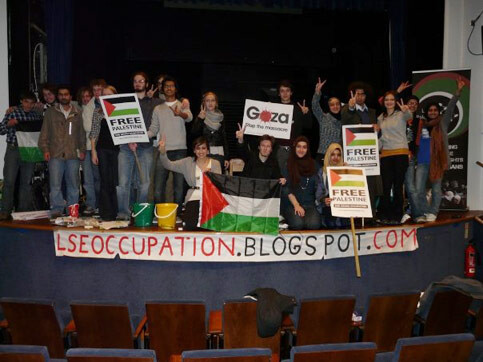The Electronic Intifada 28 January 2009

Students at the London School of Economics occupy the university’s Old Theater.
Students from at least 17 universities in the United Kingdom have staged sit-ins, as part of an unprecedented increase in British activism in support of the Palestinians.
These university “occupations” have been launched to compel administrators to meet demands ranging from official condemnation of the Israeli action to establishing scholarships for Palestinian students to study in the UK.
Students at the School for Oriental and African Studies (SOAS), part of the University of London, were the first to take action. On 13 January students occupied the prestigious Brunei Gallery Suite where, to their disgust, the university was allowing the Ministry of Defense (MOD) to stage an exhibition.
The students remained overnight in the suite only leaving after many of their demands were met. The MOD exhibit was removed and the group were allowed to use the room for the week to meet in support of the Palestinians. The students also managed to get agreement that they would be allowed to use the exhibition space for their activities throughout the year, free of charge, after they noted that the MOD had not been made to pay the usual £1,000 ($1,400) fee.
At the London School of Economics (LSE), the Student Union issued a statement that “The knowing endangerment of civilians is illegal, immoral and unacceptable and our Union has a moral obligation to stand against such action wherever it occurs.” Their demands included a request that the LSE director issue a statement in condemnation of Israeli action, and that fees be waived for Palestinians from Gaza who wished to study at LSE.
Two days later the students occupied the university’s Old Theater announcing in a press release: “We are a coalition of LSE students from many different backgrounds. Our aims are to raise awareness of the ongoing massacre in Gaza and the LSE’s complicity in this. Despite supposedly being a progressive University, the LSE has refused to issue a statement condemning the attack or bombing of the University of Gaza or divest from BAE systems, a firm that arms Israel.”
During seven days of occupation the students were addressed and supported by many influential speakers including Lindsey German, convener of the Stop the War Coalition and a former LSE student, Tony Benn, veteran anti-war campaigner, ex-Labour MP and president of the Stop the War Coalition, and Dan Judelson from Jews for Justice for Palestinians.
After a week of protest the students declared victory when it was agreed that LSE director Howard Davies would make a public statement about Israeli bombing of academic institutions, and agreed to waive application fees for Gaza students and to facilitate collection for the UK-based charity Medical Aid for Palestine. The administration also agreed to consider a paper from the Union with a plan for a divestment-based ethical investment policy. “Nothing we could have said or done would have been enough given the scale of the suffering inflicted on the people of Gaza by the Israeli military,” said one LSE student representative, “but we have achieved a huge victory for Palestinian students and student activism.”
In the midst of the LSE action, one of the occupiers Mira Hammad urged other students to organize such actions, as she spoke to a crowd of 10,000 in London’s Trafalgar Square (where huge demonstrations were held on successive Saturdays after the bombing started). Hammad’s pleas, and the examples by SOAS and LSE students inspired many others to take up the call. Across the country, students at universities including Oxford, Manchester, Essex, Warwick and Newcastle launched occupations in the following days. At the time of writing six universities continued their actions with others claiming victory and ending their protest when university authorities accepted their demands. Only Birmingham students were forcibly evicted by the police, although not before securing a meeting with the university vice chancellor.
With these occupations, following on from Oxford students’ successful disruption of Israeli President Shimon Peres’ lecture last November, student activism on Palestine in the UK is on the rise. As James Norrie, a student at Wadham College, Oxford comments on the “Occupied Oxford” blog, these actions “demonstrate the students can play a pivotal role in promoting universal principles and in supporting the occupied people of Palestine. We would hope that similar actions would be undertaken in universities worldwide.”
Abigail Humphries is a resident of Oxford.
Related Links


